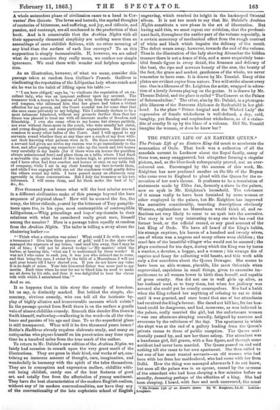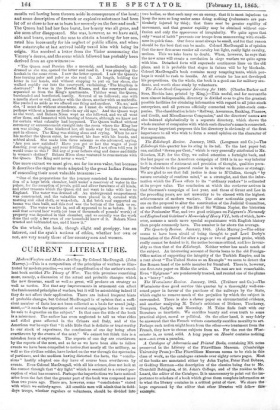THE PRIVATE LIFE OF AN EASTERN QUEEN.* The Private Life
of an Eastern King did much to accelerate the annexation of Oude. That book was a collection of all the scandals current in Lucknow about the Royal family, many of them true, many exaggerated, but altogether forming a singular picture, and, as the blue-book subsequently proved, not an over- coloured one. Encouraged by the success of this work, Mr. Knighton has now produced another on the life of the Begum who came over to England to plead with the Queen for the re- storation of her son's throne. It professes to be a translation of statements made by Elihu Jan, formerly a slave in the palace, now an ayah in Mr. Knighton's household. The substance of it seems really to have been furnished by some woman or other employed in the palace, but Mr. Knighton has improved the narrative considerably, inserting descriptions obviously Western, explanations no Mussulman would think of, and re- flections not very likely to occur to an ayah into the narrative. The story is not very interesting to any one who has read the former book, or the official record, or any good account of the last King of Oude. We have all heard of the King's habits, his strange ca prices, his harem of a hundred and twenty wives, one of whom was. a negress and many others were children ; the cruel fate of the beautiful villager who would not be amused ; the plays continued for ten days, during which the King was by turns a warrior, a devotee, a beggar, and a woman ; his strange fits of caprice and fancy for collecting wild beasts, and this work adds only a few anecdotes about the Queen Dowager. She seems to have been an able woman, placable, like most Orientals when unprovoked, capricious in small things, given to excessive im- pertinence to all women lower in birth than herself, and capable of gross cruelty. She did not use to wall girls up alive, as her husband used, or to bury them, but when her jealousy was aroused she could yet be cruelly unscrupulous. She had a habit when the King refused her anything of refusing to eat or drink until it was granted, and once heard that one of her attendants had received the King's favour. She dared not kill her, for her hus- band could be dangerous, and had, moreover, as was believed in the palace, really married the girl, but the unfortunate woman " was one afternoon sleeping soundly, fatigued by exercise and overcome by the sultriness of the day. The apartment in which she slept was at the end of a gallery leading from the Queen's private rooms to those of public reception. The Queen acci- dentally passed by, and saw her there asleep. The attendant was a handsome girl, full grown, with a fine figure, and through some accident had never been married. The Queen passed on and said nothing till she came to her own apartment. She then called to her one of her moat trusted servants—an old woman who had been with her from her maidenhood, who had come with her from Delhi. How the thing was managed afterwards I do not know, but soon all the palace was in an uproar, roused by the screams of the attendant who had been sleeping a few minutes before so soundly, dreaming perhaps of the affection of a king. She had been sleeping, I heard, with face and neck uncovered, the usual * Ths Private Life of an Eastern Qum. By W. Knighton, LLD. London: Longman. muslin veil having been thrown aside*in consequence of the heat; and some description of firework or explosive substance had been let off so close to her as to burn her severely on the face and neck." The Queen had had her face burnt, her beauty was all gone, and she soon after disappeared. She was, however, as we have said, able and brave, crossed the seas to obtain a hearing for her son, rated him incessantly for his neglect of public affairs, and when the catastrophe at last arrived boldly taxed him with being its origin. She received a letter from the Vizier announcing the Viceroy's decree, and the scene which followed has probably been derived from an eye-witness :— " The Queen read Persian like a moonshi, and immediately, half- dressed as she was, opened the letter and read it. I was preparing the hookah in the same room. I saw the letter opened. I saw the Queen's face turning paler and paler as she read it. At length, holding the letter in her hands, and without stopping to put on her shoes, she walked rapidly out into the courtyard, exclaiming, ` The kingdom is destroyed!' It was in the Dowlut Khana, and the courtyard alone separated us from the Ring's apartments. Thither went the Queen, bareheaded and barefooted, hastily. Several of us followed; one with a muslin sheet or veil, another with the shoes, another with an umbrella. She pushed us aside as we offered one thing and another. 'No, no,' said she, I must do without attendance, as I must do without a throne— perhaps without a home or food—in my old age.' And the Queen wept as she went, and Bahara Nissa wept as she followed, and we all went after them, and lamented with beating of breasts, although we knew not for certain what calamity had happened. The Queen walked without ceremony or announcement straight into the room where the King her son was sitting. None hindered her, all made way for her, wondering and in silence. The King was sitting alone and crying. When he saw his mother the Queen enter, he covered his face with his hands, and sobbed aloud. She made him three salaams as she advanced, saying, `Are you now satisfied ? Have you got at last the wages of your dancing, your singing, and your fiddling? Have I not often told you it would come to this ? Did any of your fathers sing and dance and fiddle in women's clothes?' Bahara Nissa alone ventured to remonstrate with the Queen. The King said never a word."
One more extract we must give, not for its own value, but because it describes the regular mode adopted by the great Indian Princes of concealing their most valuable treasures :—
" One of the preparations for the journey consisted in the construc- tion of a large brick chamber, built under a reservoir of water in the palace, for the reception of jewels, gold and silver furniture of all kinds, and other treasure which the Queen did not want to take with her to England. The water was drained off. An underground compartment was constructed, and the valuables were placed in it, covered with matting and oiled cloth, or wax-cloth. A flat brick roof supported on beams was then built, and this roof was the bottom of the tank or re- servoir. The water was let in, and all appeared to be as before. It is said that several laza' worth (or tens of thousands of pounds' worth) of property was deposited in that chamber, and so secretly was the work done that only a few even of our household knew of it. Bahara. Nissa trusted and befriended me, and I knew it."
On the whole, the book, though slight and gossippy, has an interest, and the ayah's notions of ethics, whether her own or not, are very nearly those of her countrymen and women.































 Previous page
Previous page